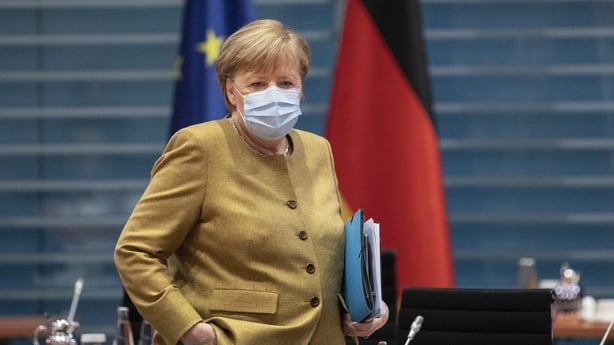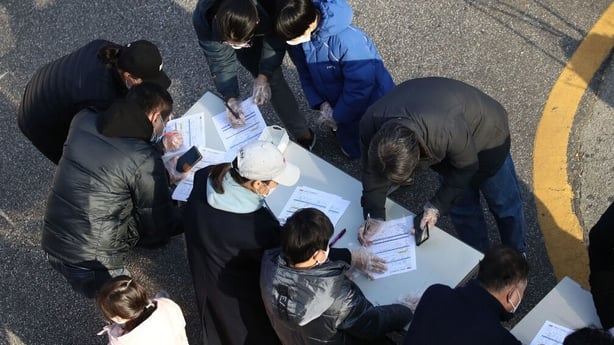Germany will go into a partial lockdown from Wednesday with non-essential shops and schools to close in a bid to halt an "exponential growth" in coronavirus infections.
The increased restrictions will apply until 10 January, with companies also urged to allow employees to work from home or offer extended company holidays, under the new measures agreed by Chancellor Angela Merkel with regional leaders from Germany's 16 states.
"That would help to implement the principle 'we're staying at home'," according to the policy paper agreed by Mrs Merkel and state premiers.
Germans are urged to limit their social contacts to another household, with a maximum of five people excluding children under 14 meeting at each time.
From Christmas Eve to St Stephen's Day, the contacts would be eased to allow gatherings with another four people excluding children, but who should be limited to close relatives or partners.
Germany in November closed leisure and cultural facilities and banned indoor dining in restaurants.
The measures had helped to halt rapid growth of infections after the autumn school holidays, but numbers had plateaued at a high rate.
Mrs Merkel had repeatedly pushed for tougher curbs to break the chain of contagion, but implementation of the rules is in the hands of individual states and some had been reluctant to impose more curbs.
Read the latest coronavirus stories
The mood however tipped over in the last week after Germany recorded new daily death tolls reaching close to 600 and as the country's disease control agency RKI reported that the infection trend has taken a worrying turn.
"Today is not the day to look back or to see what could have been, rather, today is the day to do what is necessary," said Mrs Merkel, pointing to "very high numbers of deaths" and stressing the urgent need for action.

"The corona situation is out of control," said Bavarian state premier Markus Soeder, welcoming the tougher restrictions which he pledged to implement in his state.
Germany has imposed far less stringent shutdown rules than other major European nations after coming through the first wave of the pandemic relatively unscathed.
But Europe's biggest economy has been severely hit by a second wave with daily new infections more than three times that of the peak in the spring.
Germany recorded another 20,200 new Covid cases over the past 24 hours, reaching a total of 1,320,716 cases, according to RKI data published today.
Another 321 patients died from the disease a day earlier, bringing the total death toll to 21,787.
"With increasing mobility and the therefore linked additional contacts in the pre-Christmas period, Germany is now in exponential growth of infections numbers," said the policy paper agreed by regional leaders and Mrs Merkel.
While hospitals in some regions are warning that their intensive care units are reaching capacity, huge queues of shoppers were building downtown ahead of the festive period.
Mrs Merkel had also voiced consternation at growing groups of people gathering for drinks at mulled wine stands set up by restaurants as a substitute for the popular Christmas market fare.
Germany will go into a partial lockdown from Wednesday with non-essential shops and schools to close in a bid to halt an "exponential growth" in coronavirus infections. | Read more: https://t.co/o2Tyl3nAq9 pic.twitter.com/U8rqqjJ2k6
— RTÉ News (@rtenews) December 13, 2020
From Wednesday too, alcohol sales would be banned in public places, essentially outlawing such mulled wine stands.
In a hard-hitting speech before the Bundestag on Wednesday, Mrs Merkel had issued a stark warning to Germans ahead of the Christmas holiday season when families are expected to gather.
"If we have too many contacts before Christmas and it ends up being the last Christmas with the grandparents, then we'd really have failed," she said.
Mrs Merkel's government has repeatedly said that numbers need to be brought down to 50 per 100,000 people but the rate is currently 169.1 per 100,000.
Ahead of the talks, Germany's hardest-hit states have already ordered new measures.
Saxony state, where in some areas incidence rates have hit 500 per 100,000, will shutter shops and schools already from Monday.
A curfew will also kick in from 10pm to 6am.
South Korea struggles to tackle third virus wave
Elsewhere, South Korea reported 1,030 new coronavirus cases today, a record high for a second day in a row as the country struggles to tackle a third wave of infections.
The country had previously been held up as a model of how to combat the pandemic, with the public largely following social distancing and other rules.
But a resurgence centred on the capital and surrounding area has prompted President Moon Jae-in to apologise on Facebook for his administration's failure to contain the latest wave.
Yesterday, he called the situation "very grave" after authorities reported 950 new infections, the largest daily increase since the start of the pandemic.

Yesterday's record was broken today with 1,002 new locally transmitted cases, some 786 of which were uncovered in the greater Seoul area - home to half the country's 52 million people.
The weekend numbers followed several days in which authorities reported figures ranging from about 500 to 600.
South Korea's spike came despite the government's tightening of social distancing rules in the capital area earlier this week.
The stricter restrictions include a ban on gatherings of more than 50 people and spectators at sports events.
Cafes can serve only takeaways, while restaurants must close by 9pm, with only deliveries permitted afterwards.
South Korea endured one of the worst early Covid-19 outbreaks outside mainland China, but brought it broadly under control with its "trace, test and treat" approach.
It has never imposed the kind of lockdowns ordered in much of Europe and other parts of the world.
Netherlands considering stricture measures
The Dutch government will decide on stricter measures to fight the coronavirus outbreak in the Netherlands tomorrow, as the infection rate has climbed back to the peak levels reached at the end of October.
New coronavirus infections in the country jumped by almost 10,000 in the 24 hours through this morning, data released by national health authorities showed, the biggest rise in more than six weeks.
It continues a rising trend seen over the previous week, as the effects of a partial lockdown that has been in effect since 13 October seem to have waned.
All bars and restaurants in the country have been closed since mid-October, and people were urged to work from home as much as possible, but schools and shops have remained open.
This, however, looks likely to change after an emergency cabinet meeting scheduled for tomorrow, Dutch media said.
Citing government sources, public broadcaster NOS said the government was considering closing all non-essential shops for several weeks and extending the Christmas break for schools among measures to stop the spread of the disease.

